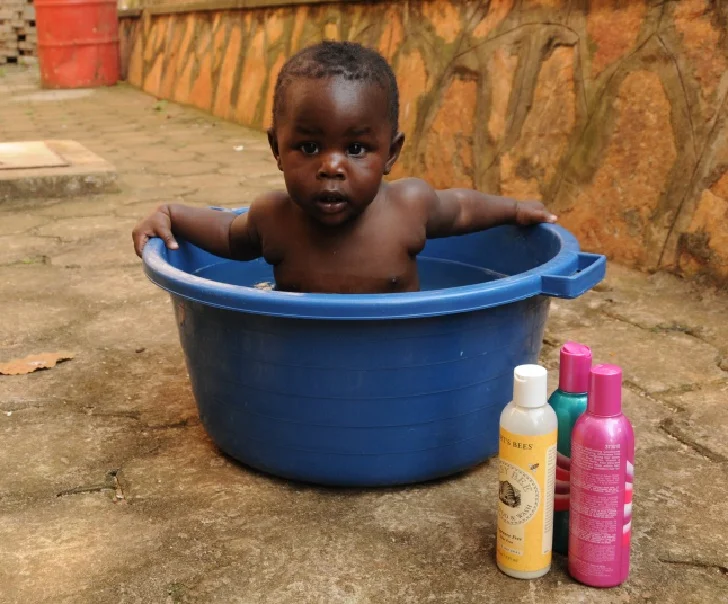Every baby's skin has an individual tolerance to different soaps. How much soap, how often, and which kind can be determined only by trial and error.
Mild and soft, gentle on your skin, lasts longer, keeps germs away from your body! These are some of the slogans that soap manufacturers are splashing across various media platforms to attract customers. Indeed many have been quick to embrace any soap that has a nice scent, ‘lovely’ color (depending on one’s preferred color) and attractive packaging. However, experts warn against rushing to buy bathing soap for babies without doing due diligence because it could cause more harm than good to the child.
WHAT YOU OUGHT TO KNOW
Medicated soap not a must for children. Only children with skin problems such as eczema or similar skin diseases may require medicated soap but not all children need special soap.
Avoid the hype about soap because certain chemicals within certain soap may be harmless to adults but harmful to infants.
Some of the chemical compounds in soap could evoke allergic reactions in some individuals and that should be a concern for babies too.
Soap can be used for washing a baby but it can be in a small quantity. Washing with clean, soft luke warm water alone or even with natural herbal products like turmeric is also good enough
Baby’s skin, especially a newborn’s, is sensitive, and all soaps are mild irritants. The function of soap is to suspend particles and oils on the skin surface so that they can be more easily removed from the skin with water.
It is advisable to limit the soap’s time on the skin to less than five minutes to avoid drying or irritating the skin.
At zero years, children have soft skin that is highly permeable and only hardens as they grow. They should not be subjected to common soap, they should be subjected to cleansers instead and moist cleansers that are not soap-based are the best.
A good cleansing agent is one that is slightly acidic since the skin of the baby being permeable, it is subject to microflora attack.
When the PH of the skin is altered, its physiology is also altered and this may promote the growth of harmful bacteria. This is why a good cleanser should have PH slightly below 7 (below neutral PH) that destroys cell membranes of bacteria.
Without soap, some oils, dirt, and surface secretions would simply stick to the skin and require vigorous rubbing with a cloth and water to remove them, which in itself would irritate the skin.
Here are some general guidelines:
☛ Use soap only on areas that are caked with secretions, (such as oil or sweat) which are not easily removed with plain water.
☛ When first using soap, try a test rub on one small part of the body. If over the next few hours the skin reddens, dries, or noticeably changes in any way relative to other areas, ban that soap and try another.
☛ Use mild soap. Bathing baby soaps are regular soaps with fewer additives such as antimicrobial, fragrances, or abrasives.
☛ Limit the soap’s time on the skin to less than five minutes to avoid drying or irritating the skin. Wash it off as soon as possible and rinse the skin well.
☛ Above all, avoid vigorous scrubbing of any area of the skin with soap.
If your baby is prone to eczema or has allergic dermatitis, use as little soap as possible, and give as few baths as possible. A special soap formulation prescribed by a dermatologist may be helpful. Babies with particularly sensitive skin should spend very little time in a bathtub immersed in water and are best showered and spot cleaned.
Shampoos are similar to soaps and if overused can irritate the scalp and rob the hair of natural oils. Shampooing once a week is enough for most babies. Use mild baby shampoo; like baby soaps, baby shampoos contain fewer additives than other commercial shampoos. It is seldom necessary to massage shampoo deep into the scalp. If your baby’s scalp is covered with the flaky, crusty, oily substance called cradle cap, after shampooing massage a bit of vegetable oil into the crust to soften it, and then remove it with a soft comb.
Here is a final thought about soaps and shampoos.
Sensitive mothers feel that too much soap and shampoo (and scented oils and powders) camouflage natural baby scents that mothers find irresistible. Also, it is better not to mask the mother’s natural scent, which baby needs, and perfume is irritating to some babies.
To use or not use powders, oils on babies. Gone are the days when a baby was sprinkled with perfumed talcum after every bath. Powders and oils are unnecessary since your baby’s skin is naturally rich in body oil and they may be irritating and even harmful.
Emollients (cold-pressed vegetable oil or Soothe and Heal by Lansinoh) may be used only on patchy areas of dry skin; otherwise, they are unnecessary. Powders easily cake and build up in skin creases and can actually contribute to skin irritation and rashes. Also, powders, if inhaled, can irritate your baby’s nasal and air passages.
Cornstarch is not recommended as it can serve as a medium for the growth of harmful fungi.
